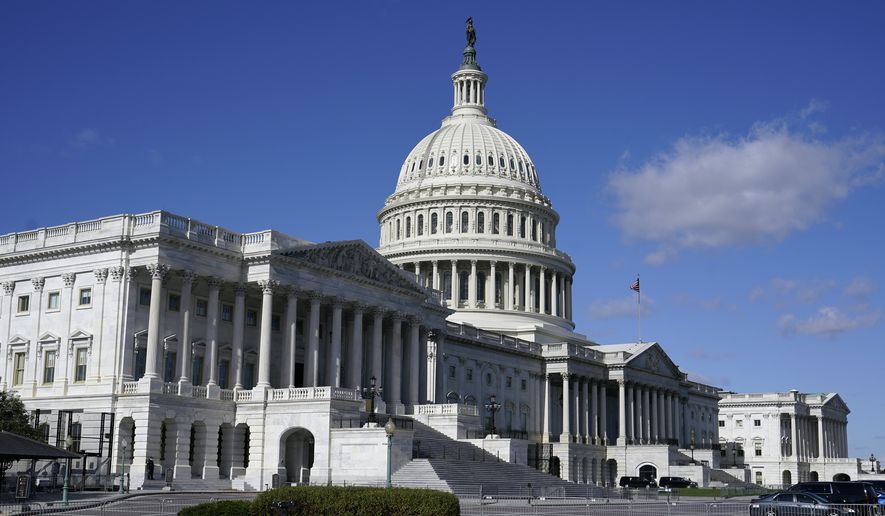OPINION:
As the U.S. scrambled to locate personal protective equipment and other emergency medical supplies during the COVID-19 outbreak, our nation’s dangerous reliance on critical goods from foreign adversaries such as China was fully exposed, catalyzing the U.S. government to take action. Passed this past summer, the CHIPS and Science Act supported America’s push to reduce its dependence on non-allied supply chains.
But supply chain disruptions that abounded during the pandemic persist today. Despite the waning urgency of the pandemic, the need for supply chain resilience remains just as important: Russia’s war against Ukraine combined with China’s acts of economic aggression demonstrates that critical supply chains are still at risk of disruption. Though the CHIPS Act’s passage was an important step forward in strengthening the U.S. manufacturing supply chain, we can and should do more.
One move in this direction is coming from a bipartisan coalition of legislators led by Sens. Bob Casey, Pennsylvania Democrat, and John Cornyn, Texas Republican, who are urging passage of the National Critical Capabilities Defense Act — legislation intended to secure supply chains critical to U.S. national security. The bill creates a cross-agency government committee to review certain outbound (foreign) investments made by U.S. companies seeking to offshore building, development, operations or other activities involving a “national critical capability” to “countries of concern” — namely, China and Russia.
If found to risk national security, the committee would be tasked with recommending appropriate action to the president, such as prohibiting the transaction if necessary. Importantly, national critical capabilities may include critical minerals and materials, supply chains that are at high risk of disruption.
In a recent letter to President Biden, legislators have urged the White House to issue an executive order to secure critical supply chains by establishing a review process for certain outbound investments. More oversight is necessary, they argue, to prevent the continued offshoring of both critical production capacity and intellectual property to foreign adversaries. Screening inbound investments to the U.S. from foreign companies has long been a standard practice, but screening outbound investments would signal a proactive shift in American foreign policy.
The Biden administration should not delay enacting initiatives to support domestic industry; U.S. supply chains cannot afford more systemic shock. Though some American firms generally do not favor increased government oversight, unfettered investment in Chinese companies could result in the development of technologies that advance military and surveillance capabilities in the Chinese People’s Liberation Army and undermine U.S. national security and business interests.
Russia’s war in Ukraine also continues to limit access to critical exports such as titanium, palladium, neon gas, wheat, and other agricultural commodities. Simply put, if we fail to prioritize U.S. manufacturing and technology, adversaries will exploit our weaknesses and will only grow stronger.
American manufacturing and technological development can thrive even with narrow limits on outbound investment. Innovative alternatives to foreign investment and suppliers exist right here at home; supporting them advances U.S. economic and national security interests and reduces vulnerabilities caused by foreign dependence.
Few U.S. industries managed to avoid the disruptive effects of the global supply chain crisis, and titanium is no exception. Titanium’s unique strength-to-weight ratio and excellent corrosion resistance make it essential in industries critical to our national security, including aerospace, military, and the medical sector. Yet in 2020, the U.S. closed its last titanium sponge plant and is consequently nearly 100% reliant on foreign suppliers for its primary titanium metal — 70% of which is controlled by Russia and China.
The U.S. would do well to take a closer look inside its borders at groundbreaking American technologies that can relieve pressure within the titanium supply chain. One example is hydrogen assisted magnesiothermic reduction, which can produce low-cost, low-carbon titanium metal powder entirely from titanium minerals or recycled titanium scrap feedstock. Not only is this process more sustainable than the industry standard, it makes titanium more affordable and accessible for broader uses beyond conventional applications.
In the words of Mr. Casey, the United States is “in an economic war … whether we want to use that language or not.” If we are to protect America’s economic and national security, we must fully invest in the opportunities right here at home — and better safeguard against those who seek to undermine us.
- Anastasios “Taso” Arima is co-founder and CEO of IperionX, a developer of U.S.-based sustainable critical materials, including titanium and rare earth elements. The company holds the rights to the Titan Project, a critical mineral development in western Tennessee, and has selected Halifax County, Virginia, as the site of its first commercial-scale, 100% recycled, low-carbon titanium metal powder operation.




Please read our comment policy before commenting.